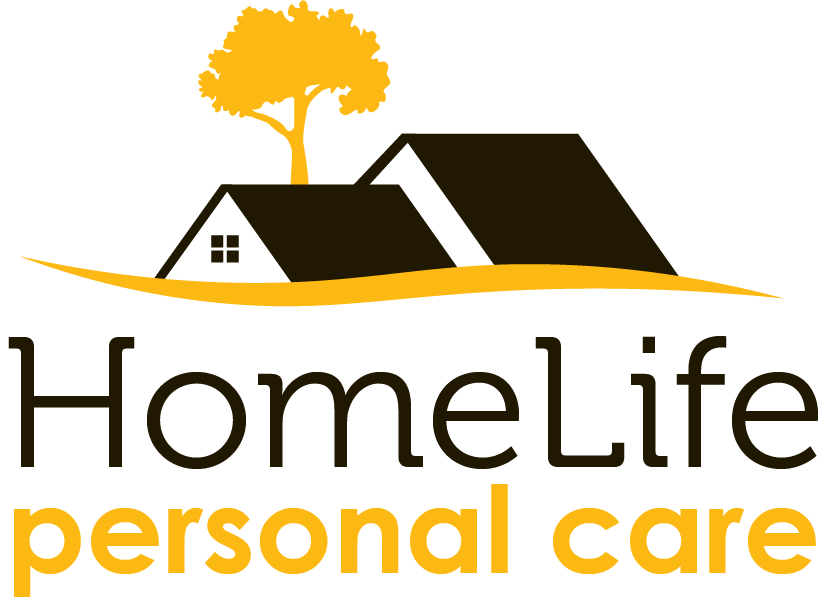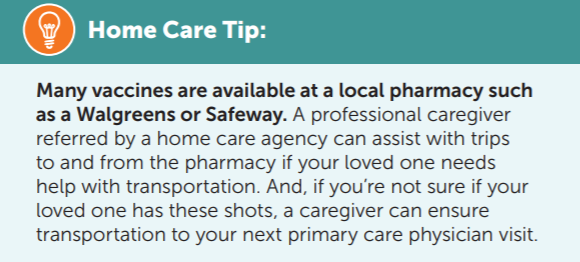What Shots and Vaccines Should Seniors Have?
Older adults may have weakened immune systems and should get vaccines to stay healthy and help protect them from diseases and illnesses.
As we age our immune systems begin to weaken, making us more susceptible to contracting diseases and various illnesses. Vaccines can help guard against some of the more common diseases. Seniors may need to get various vaccines, even if they received the same vaccines as a child.
This guide discusses various vaccines often recommended by doctors for seniors. Talk with your loved one’s primary care physician to see what vaccines are right for your loved one.
Influenza (Flu)
Why your aging loved one should get the vaccine It is recommended by the CDC that people over age 50 get the flu vaccine every year to protect themselves against flu season. Getting the vaccine can reduce flu sickness, doctor visits and prevent hospitalizations and deaths related to the flu.
How to get the flu vaccine
You can get the flu vaccine from your doctor or at a local pharmacy such as CVS or Safeway. Your insurance will likely cover the cost. Check with your insurance company before visiting your healthcare provider to be sure.
When to get the vaccine
Get the flu vaccine every year. You can get the vaccine in the early Fall, or as soon as it is available in your area. It is ideal to get it by October, so that you are protected as flu season starts to hit. Flu season is typically December through February, but can sometimes last as late as May. If you didn’t receive the vaccine in the Fall, you can still get it later in the year, as long as it’s available near you. Use the flu vaccine finder to find a location near you. http://flushot.healthmap.org/
Shingles (Herpes Zoster)
Why your aging loved one should get the vaccine
The risk of developing shingles increases with age. Shingles is a painful skin rash that most frequently appears on one side of the face or body. Getting the vaccine will help reduce the risk of getting the disease as well as reduce the long-term pain that comes with it. Even if an adult had Chickenpox as a child, they can and should still get the shingles vaccine.
How to get the vaccine
The vaccine can be given at your doctor’s office or a pharmacy. It is given in one dose as a shot. Individuals with weakened immune systems from HIV/AIDS, cancer treatments or other immune-weakening diseases should not get the vaccine.
When to get the vaccine
Adults over age 60 should the vaccine. Protection from shingles with the vaccine lasts approximately 5 years, so individuals may need to receive the vaccine several times later in life. You can get the vaccine any time of year.
Pneumococcal disease (Pneumonia)
Why your aging loved one should get it
Pneumococcal disease can cause infections such as pneumonia, meningitis, bloodstream and ear infections. The vaccine can help prevent severe disease but is not guaranteed to prevent infection in all people. There are 2 types of pneumococcal disease vaccines: PCV13 and PPSV23.
How to get the vaccine
Talk to your healthcare provider about receiving the vaccine as well as confirming which is the right vaccine for your loved one. Certain medical conditions may affect the vaccine they need.
When to get the vaccine
Adults who are 65 years or older and who have not previously received PCV13, should receive a dose of PCV13 first, followed by a dose of PPSV23 in 6 to 12 months. Adults 65 and older who have already received one or more doses of PPSV23, should get a dose of PCV13 at least one year after receiving the most recent dose of PPSV23.
Tetanus, Diphtheria and Pertussis (Whooping Cough)
Tdap is a tetanus, diphtheria and pertussis vaccine given to adults as a one-time vaccine. Getting the Tdap vaccine will help protect against all three conditions.
Why your aging loved one should get the vaccine
Even if an adult received these vaccines as a child, their immunity may have worn off. Getting the booster vaccine will help protect individuals from the diseases as well as their loved ones. Whooping cough can come on and feel like a regular cold and is highly contagious.
Any infants exposed to an adult with whooping cough could be in danger of contracting the disease. Tetanus causes painful tightening of the muscles. It can lead to an individual’s jaw locking, prohibiting them from being able to swallow or even open their mouth. It can also lead to death.
It doesn’t spread through people, but rather through bacteria found in dust, soil and manure. Diphtheria is an infection caused by bacteria and spreads from person to person. The bacteria attach to the lining of the respiratory system, and can cause a fever, breathing problems, paralysis, heart failure and death.
How to get the vaccine
A healthcare professional can administer the vaccine.
When to get the vaccine
Adults who received the vaccines as a child should get the Tdap booster every 10 years. The vaccine is available year round.


